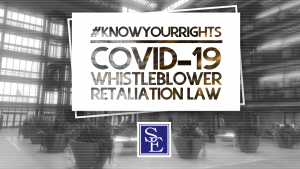Many of us have heard of employee whistleblowers who go public with their employer’s egregious wrongdoings and suffer job loss or other retaliation for doing so. Both the federal government and the State of New Jersey offer protections to these conscientious employees. For example, a federal law called the Whistleblower Protection Act of 1989 protects employees who disclose evidence of illegal or improper governmental activities. In New Jersey, we have enacted the Conscientious Employee Protection Act, which is viewed as one of the furthest reaching whistleblower laws in the country. Whistleblower laws such as these were enacted to assure that employees have protections when they do the right thing and oppose unlawful activity of their employer. We, as a society, belief that employers and the government must play within the rules to protect people from being harmed from dangerous situations that can be caused by unlawful conduct.
 There is perhaps no better example of the importance that whistleblowers can play in stopping governmental behavior that can cause harm to people than the allegations that Dr. Rick Bright has made against the government concerning its COVID-19 response. Dr. Bright was recently ousted from his prominent position as Director of the Biomedical Advanced Research and Development Authority (BARDA) for what he alleges was in retaliation for disclosing certain violations of law, gross mismanagement and waste of funds, abuse of authority and substantial and specific danger to public health and safety of the government in response to the Covid-19 pandemic.
There is perhaps no better example of the importance that whistleblowers can play in stopping governmental behavior that can cause harm to people than the allegations that Dr. Rick Bright has made against the government concerning its COVID-19 response. Dr. Bright was recently ousted from his prominent position as Director of the Biomedical Advanced Research and Development Authority (BARDA) for what he alleges was in retaliation for disclosing certain violations of law, gross mismanagement and waste of funds, abuse of authority and substantial and specific danger to public health and safety of the government in response to the Covid-19 pandemic.
Dr. Rick Bright recently began making headlines when he went public with his Complaint alleging Whistleblower Retaliation filed with the United States Office of Special Counsel. In the lengthy filing, Dr. Bright alleges that he was fired from his position within the Department of Health and Human Services (HHS) after he refused to spend money on unproven and potentially dangerous drugs that the White House was touting as promising treatments for Covid-19, and he resisted pressure to put in place a national program geared toward expanding public access to those drugs.
Dr. Bright first joined HHS in 2010 as a Program Lead for the Influenza Program within BARDA. There, he successfully expanded pandemic preparedness in developing countries, including their capacity for vaccine production. In 2014, Dr. Bright was promoted to Director of BARDA’s Influenza and Emerging Diseases Division, and then in 2016 was promoted again to Deputy Assistant Secretary for Preparedness and Response and Director of BARDA.
When the Covd-19 pandemic came to the United States, government officials began to assert pressure on BARDA to invest in vaccines and treatments that were not being properly vetted for safety or effectiveness. Dr. Bright objected and began to suffer the consequences. He started receiving unfounded criticism of his work, in particular his efforts to shore up supplies of personal protective equipment (PPE) for medical workers. As he continued to resist the demands of government officials to invest in the use of untested drugs being produced in uninspected factories overseas, tensions at his workplace grew.
Dr. Bright eventually shared his experience and knowledge regarding these issues with a reporter, and according to his Complaint, in so doing he hoped to shine a light on HHS’ reckless efforts to provide unsafe drugs to the American public. Within days of the reporter’s article being published, Dr. Bright was fired from his position with BARDA.
Dr. Bright’s claims fall under the federal Whistleblower Protection Act, which protects federal employees and job applicants from retaliatory actions by their employer when the employee chooses to disclose violations of law, gross mismanagement or waste of funds, abuse of authority, or dangers to public health and safety. In 2012, Congress also passed the Whistleblower Protection Enhancement Act (WPEA), which strengthened protections for federal employees who report fraud, waste of funds and abuse of authority by making clear that the protection applies to these employees regardless of the employee’s motives in disclosing, who they disclose to, or whether the activity has already been disclosed before. It also protects disclosures that an employee reasonably believes are evidence of censorship that will cause a gross government waste or mismanagement, an abuse of authority, a substantial and specific danger to public health or safety, or any violation of law. In addition, it expanded the penalties imposed for violating whistleblower protections. Dr. Bright’s Complaint is being investigated by the Office of Special Counsel, which will determine whether there was any wrongdoing in removing him from his post.
It will be interesting to watch what comes out of Dr. Bright’s lawsuit and whether he is able to prove his allegations. If he is successful in showing that he engaged in protected activity in connection with the complaints he made, and can prove that his termination was caused in part in retaliation for his whistleblowing activity, he will be entitled damages that he sustained as a result of the retaliation. More importantly for society, this lawsuit will shed the public light to very serious issues concerning how the government acted regarding the safety and health of its citizens and whether they acted legally. Our New Jersey employment lawyers will continue to monitor this important national case, as well as other legal developments in federal and New Jersey whistleblower employment law.
 New Jersey Employment Lawyers Blog
New Jersey Employment Lawyers Blog

